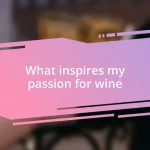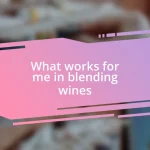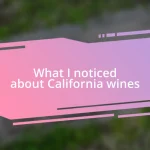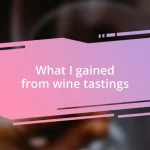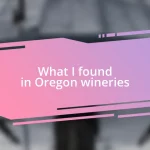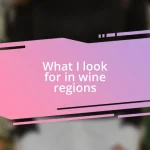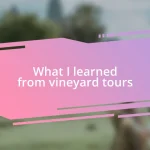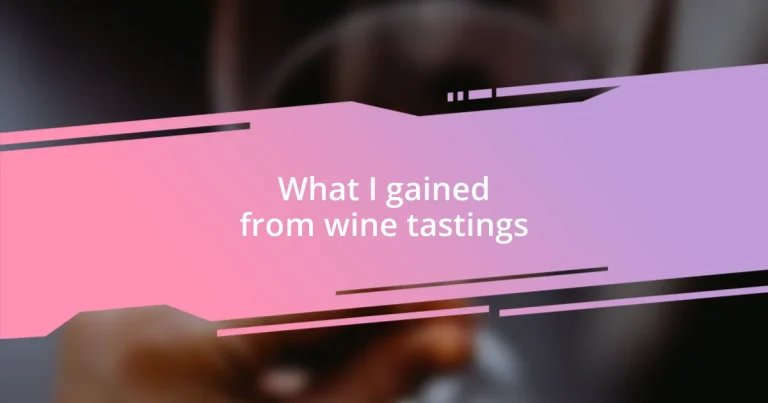Key takeaways:
- Wine tasting is an immersive sensory experience that enhances appreciation for different varietals through observation, smell, and taste.
- Social interactions during wine tastings foster connections, creating lasting memories and deeper conversations about shared experiences and wine narratives.
- Learning about wine flavors, including fruitiness, earthiness, spiciness, and floral hints, enables tasters to develop a refined palate and emotional connections to their experiences.
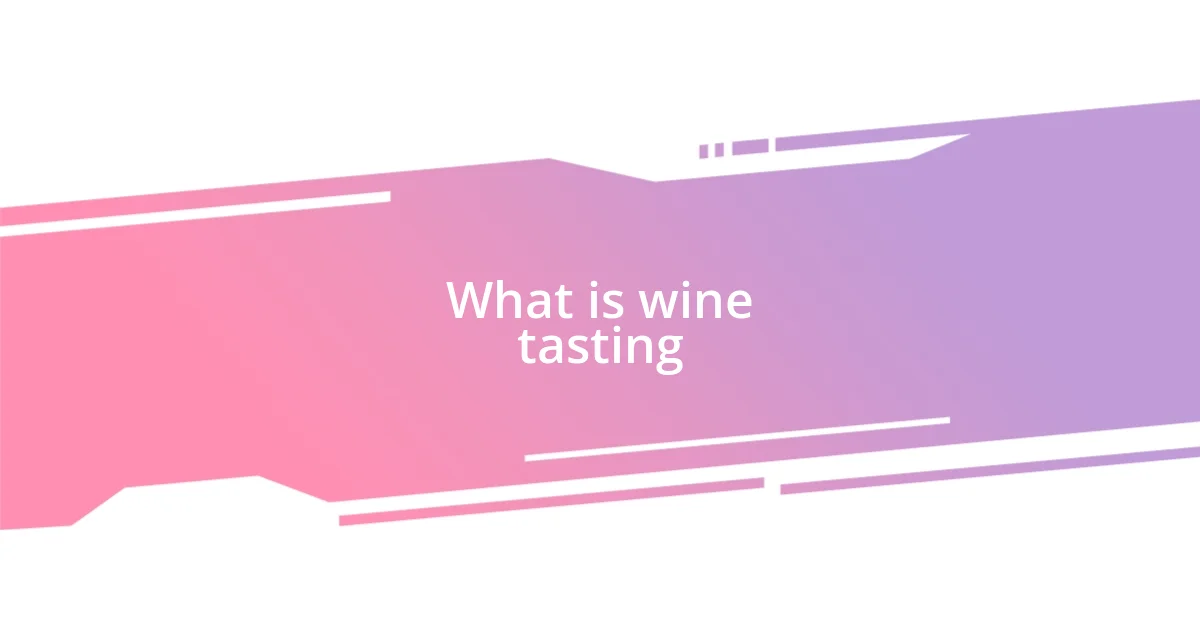
What is wine tasting
Wine tasting is more than just sampling different varieties; it’s an immersive experience that engages all the senses. I remember my first tasting vividly. Surrounded by the soft clinking of glasses and the fragrant wafts of different aromas, I found myself eagerly anticipating the flavors hidden within each pour. Isn’t it fascinating how the same grape can express itself differently depending on its region and winemaking process?
As I swirled a deep red in my glass, the hues whispering tales of the vine, I realized that true wine tasting involves observation, smell, and taste intertwining in a delicate dance. The rich scents of ripe berries and earthy undertones made me pause, inviting me to delve deeper into understanding what I was experiencing. Have you ever stopped to consider why one wine feels so much warmer and friendlier than another, even when both are served at the same temperature?
Engaging in wine tasting opens up a world of storytelling and exploration. Each bottle has a narrative, from the vineyard’s history to the climate of the year it was produced. I often find myself lost in conversation with fellow tasters, sharing our thoughts and findings, which enhances the tasting experience. Isn’t it wonderful how wine can connect people, creating shared moments and memories over a simple glass?
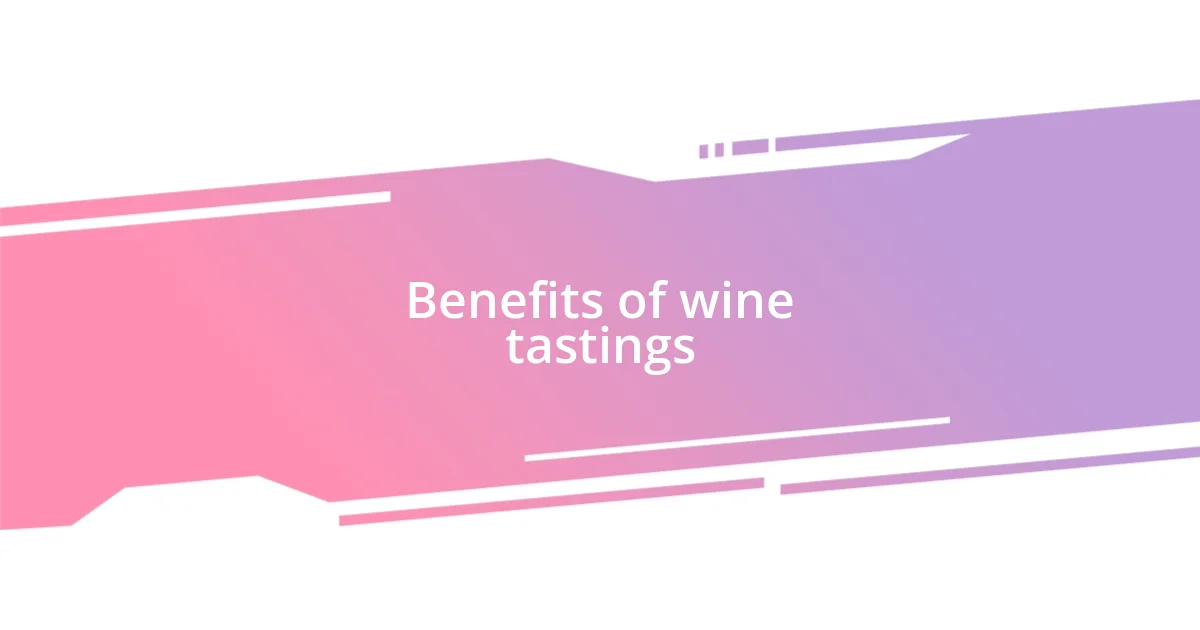
Benefits of wine tastings
Wine tastings offer a delightful opportunity to enhance your palate and develop a deeper appreciation for different varietals. When I attended a local wine tasting event, I was amazed to discover how my taste buds responded to nuances I had previously overlooked. The expert host guided us through the wines, helping us identify flavors ranging from fruity to floral. This kind of focused tasting helps build a more refined palate, making each sip more enjoyable.
Moreover, wine tastings serve as an excellent educational experience. I remember feeling utterly novice during my first tasting, but as I listened to the winemaker’s insights, I learned about unique production methods and regional characteristics that make each wine special. This newfound knowledge not only changed the way I experienced wine but also sparked countless conversations with friends who share a love for it. Have you ever found yourself eager to impress others with your knowledge after a good tasting session?
Lastly, the social aspect of wine tastings cannot be overstated. I often find myself laughing and connecting with fellow attendees over shared impressions of the wines. One memorable evening, I met someone who shared my appreciation for robust reds, and we ended up swapping recommendations that lasted long after the event. The camaraderie experienced during these sessions truly enhances the joy of wine discovery, creating lasting connections and cherished memories.
| Benefit | Description |
|---|---|
| Refined Palate | Enhances your ability to identify subtle flavors in different wines. |
| Educational | Increases knowledge about wine production methods and characteristics. |
| Social Connections | Fosters connections and shared experiences with fellow wine enthusiasts. |
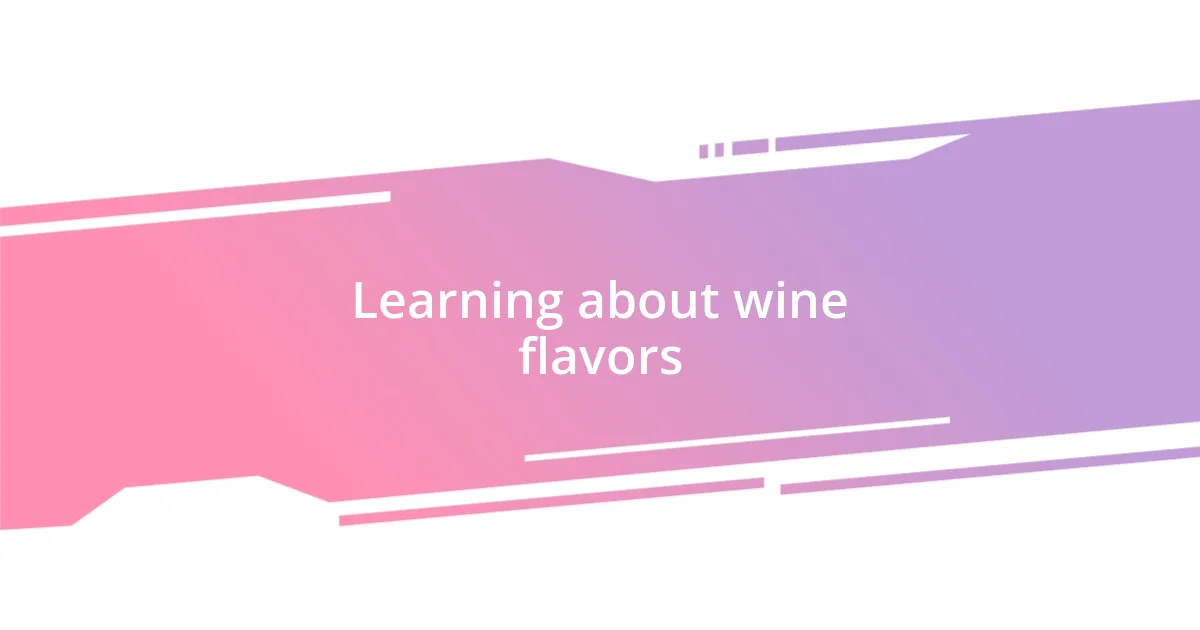
Learning about wine flavors
Learning about wine flavors has transformed my perspective on what I drink. I used to think a good wine was just based on personal taste, but after attending a few tastings, I realized how many layers of flavor actually exist. For example, I remember the moment I tasted a Sauvignon Blanc that had citrus notes with a hint of grassiness. That combination surprised me, igniting my passion for uncovering the stories behind the flavors.
Here are some key aspects about wine flavors that I’ve learned along the way:
- Fruitiness: Many wines exhibit flavors associated with fruits like cherries, berries, or stone fruits, directly influencing your experience and preference.
- Earthiness: Wines can have earthy undertones, reminiscent of soil or mushrooms, adding complexity and depth, which I now appreciate more with each sip.
- Spiciness: Some varietals might offer spicy notes, like pepper or even cinnamon, triggering a unique sensory experience that’s delightful to identify.
- Floral hints: Certain wines boast floral characteristics, such as jasmine or lavender, which can elevate a tasting experience and create a serene ambiance.
Each of these elements creates a rich tapestry of flavor that I never fully grasped before. I also cherish the moment during a tasting when we were encouraged to describe what we sensed. My heart raced as I shared that I detected a hint of vanilla, realizing how much breadth there was in a single glass. It’s incredible how each tasting can reshape your understanding of a wine’s complexity!
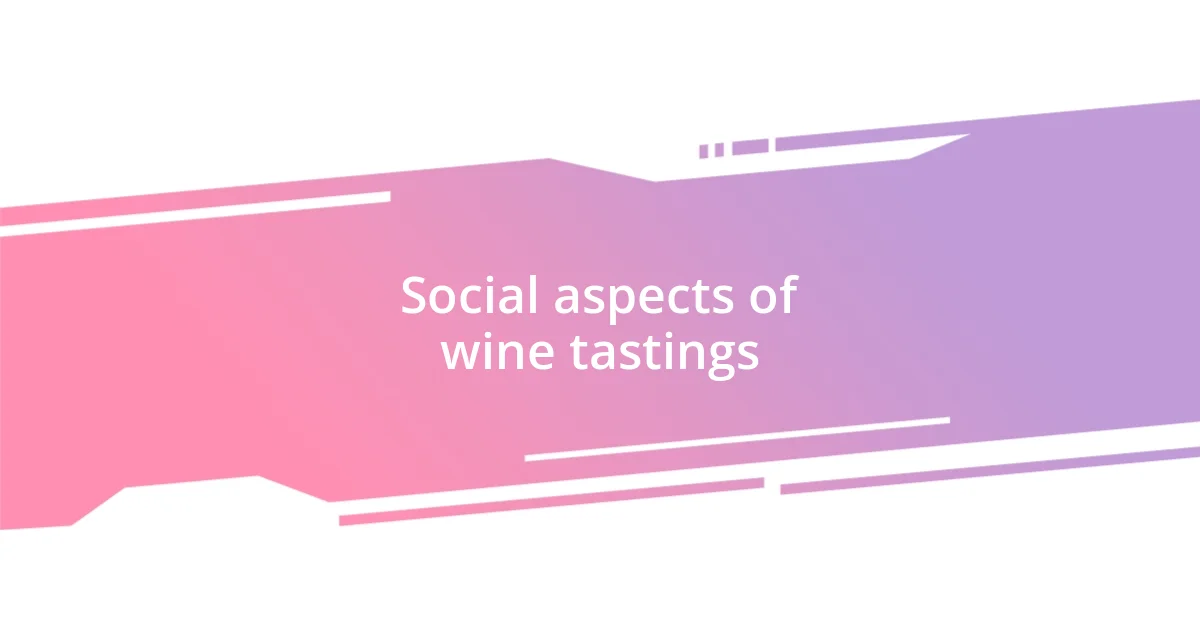
Social aspects of wine tastings
Attending wine tastings has always felt like stepping into a vibrant social scene where everyone is eager to share. I recall one evening where the energy was palpable—people mingling, glasses clinking, and laughter echoing around the room. It wasn’t just about the wines; it was the stories we shared and the connections made over our favorite pours that truly enriched the experience. Have you ever found that the best memories often come from shared moments like these?
In many ways, these tastings turn strangers into friends. I remember chatting with a fellow enthusiast about our first introduction to wine. We laughed as we reminisced about those awkward early days, swirling our glasses with uncertainty. That shared vulnerability created an instant bond and lingered long after the event. Wine tastings have a unique way of breaking down barriers, fostering an inclusive atmosphere where everyone feels welcome. Don’t you think it’s wonderful how a simple glass of wine can spark such meaningful connections?
What truly struck me was how our conversations evolved as the night went on. With each flight of wine we sampled, our dialogues deepened, touching upon everything from travel experiences to personal stories tied to certain varietals. There was one moment, surrounded by a circle of newfound friends, where I expressed my admiration for a particular Chardonnay. The resulting discussion was an inspiring exchange of perspectives, leaving me with new insights and recommendations to explore. It’s a reminder that wine tastings are not just events; they’re social experiences that cultivate community and shared enjoyment.
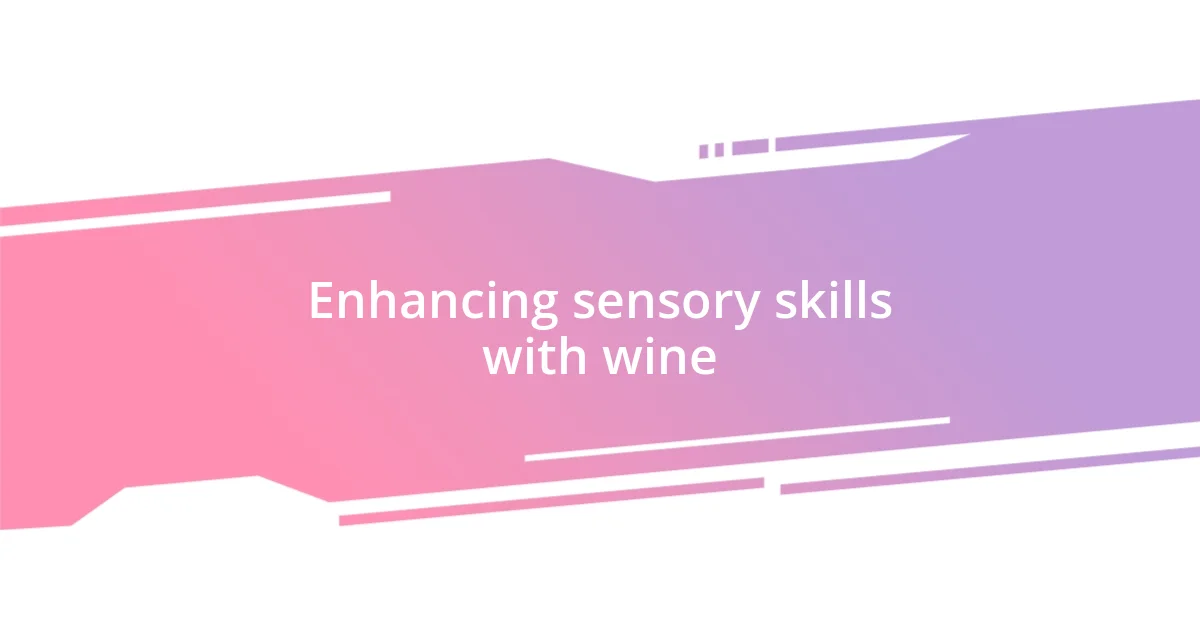
Enhancing sensory skills with wine
Enhancing sensory skills with wine has been a journey I never anticipated. During one memorable tasting, I was completely captivated by a deep, ruby-red Cabernet Sauvignon. As I sipped, I closed my eyes and tried to identify the aromas lifting from my glass. The oakiness struck me first, followed by unexpected hints of chocolate. This exercise taught me how nuanced our senses can be if we allow ourselves the time to explore. Have you ever tried just inhaling a wine before drinking? It’s an entirely different experience.
As I delved deeper into the world of wine, I learned to embrace a more mindful approach. At a recent tasting, I challenged myself to identify the various layers in a bold Merlot. I began by swirling the wine and letting it breathe, allowing the scents to awaken memories from childhood. I could almost smell the autumn leaves and the warmth of baked spices from my grandmother’s kitchen. This emotional connection transformed the way I related to wine; it was like rediscovering an old friend through familiar scents. How do the aromas of your favorite wines draw you into your own cherished memories?
Every tasting feels like a new lesson in sensory appreciation. I remember a moment when a sommelier guided us through a flight of whites, emphasizing the importance of texture. As we tasted a creamy Chardonnay, the smoothness on my palate was unlike anything I had experienced before. I began to realize that wine is not just about taste; it’s a symphony of sensations from sight to aroma to feel. This understanding truly cultivated my sensory skills, making each new wine a delightful challenge to unravel. Isn’t it exciting how one glass can open up a world of sensory exploration?
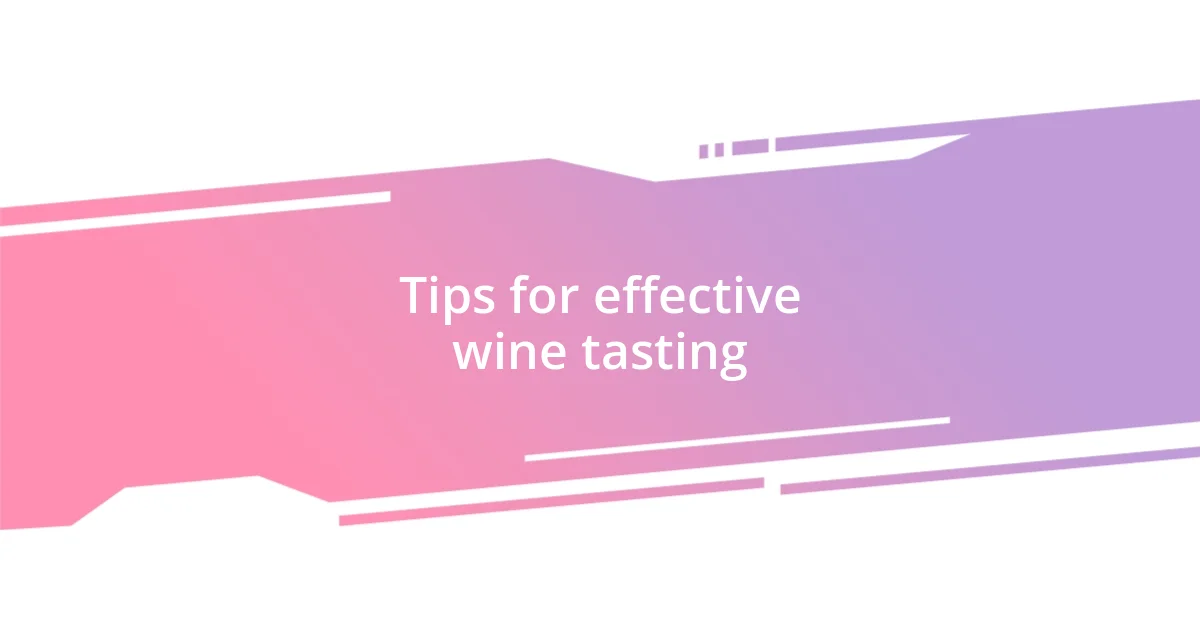
Tips for effective wine tasting
When it comes to tasting wine effectively, preparation plays a crucial role. I’ve found that a good practice is to start with a clean palate, perhaps by having some plain crackers or bread before diving in. This simple step can help the flavors of the wine shine without any distractions. Have you ever noticed how lingering tastes can overshadow the subtleties of a new sip?
Next, I highly recommend taking your time. During a recent tasting, I watched as others hurriedly judged wines without savoring them. It was a reminder that wine appreciation grows through patience. I remember lingering over a delicate Sauvignon Blanc, allowing its crisp notes to unfold gradually. It made me realize that rushing through can often mean missing out on the intricate layers that a wine has to offer. Why not dedicate a few extra moments to each glass instead?
Lastly, engaging your senses beyond taste can elevate your experience. Whenever I find myself amid a tasting, I usually close my eyes to focus solely on the aromas and textures. At one event, this practice revealed a surprising bouquet in a Pinot Noir that I would have otherwise overlooked. The cherry notes danced in my mind, evoking memories of summer picnics. Have you ever paused to really feel what a wine brings to you personally? This attention transforms tasting into something much deeper than simply recognizing flavors.
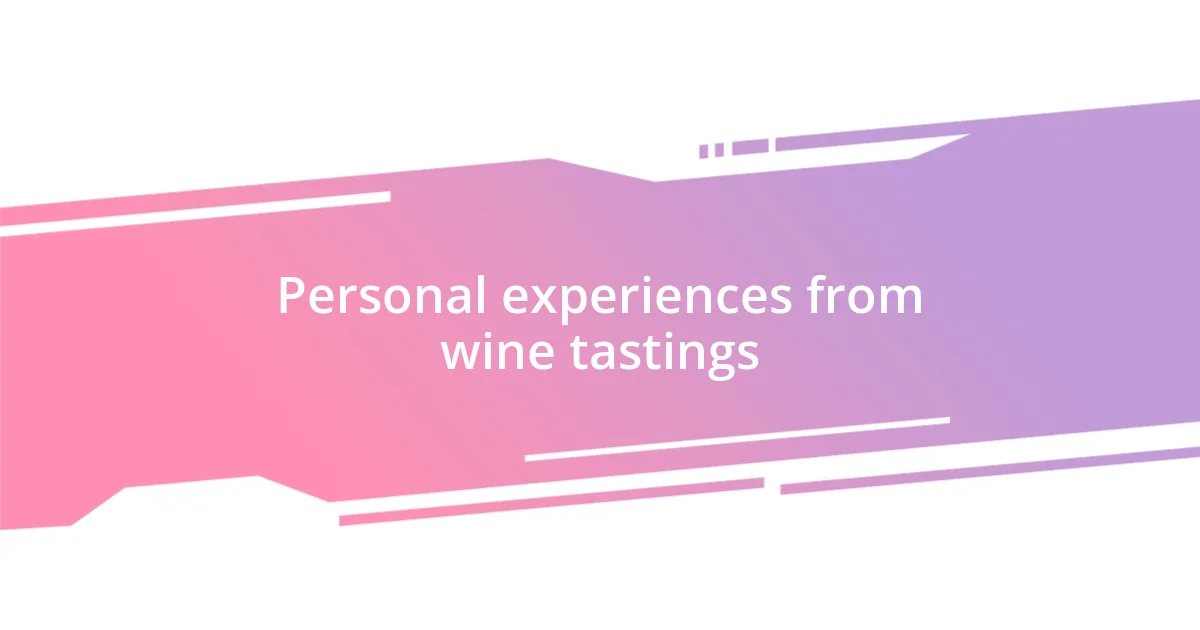
Personal experiences from wine tastings
I remember one wine tasting where the atmosphere was thick with laughter and conversation, yet I found myself lost in contemplation. It was during a pairing of whites and cheeses that a certain Gewürztraminer took me by surprise. As I savored its sweet, floral notes, I was transported back to a summer garden party as a child. The scent of blooming jasmine mixed with memories of family gatherings filled my mind. Have you ever experienced that kind of nostalgia through a taste?
At another event, I was fortunate enough to sit next to a seasoned wine enthusiast who shared stories of rare vintages and legendary wineries. As he described a particularly difficult harvest, I began to understand the stories behind the bottles. That evening, tasting an elegant Pinot Noir, I felt an appreciation for the labor and passion that goes into each glass. It’s a deeper connection that can transform an ordinary experience into something profound. How often do we stop to think about the journey of our wine before it reaches our glass?
One tasting left a lasting impression when we explored regional varietals. Tasting a crisp Riesling from the Finger Lakes, I was struck by the vibrant acidity and how it danced on my tongue. We then moved to a robust Syrah from the West Coast, which showcased bold fruit flavors. The contrast made me realize how geographical nuances influence the character of wine. It dawned on me that every sip tells a story of its origin. Isn’t it fascinating how a simple glass can bridge cultures and convey the essence of a place?
